- Home
- Conn Iggulden
Bones of the Hills Page 4
Bones of the Hills Read online
Page 4
The emperor’s city of Yenking had fallen to these primitive horsemen. Its great armies had not held them. With that example, no one in Kaifeng had real hope. The streets were ruled by ruthless gangs and only the strong dared go out at all. Food was distributed from a central store, but some days they had nothing. No one could know if the food was running out, or if it had been stolen on the way.
In the camp, Khasar rose to his feet, roaring in excitement with Ho Sa as the wrestler known as Baabgai, the Bear, heaved his opponent up over his head. The vanquished man struggled at first, but Baabgai stood unmoving, beaming like a stupid child at his general. The bets dwindled to a trickle and then nothing. The man he held was so battered and exhausted that he only tugged feebly at Baabgai’s square fingertips.
Khasar had found the wrestler among his Chin recruits, marking him apart immediately for his size and strength. He looked forward to having the massive idiot challenge one of the champions at home. If he judged the wagers well, he could beggar a few men in one match, his brother Temuge among them.
Baabgai waited impassively for Khasar’s order. Few others could have supported a grown warrior for so long and Baabgai’s face was pink and shiny with sweat.
Khasar stared through the big wrestler, his thoughts returning to the message from Genghis. The scout his brother had sent still stood where Khasar had placed him hours before. Flies were sucking at the salt on the scout’s skin, but the young man dared not move.
Khasar’s good mood vanished and he gestured irritably to his wrestling champion.
‘Break him,’ he snapped.
The crowd took a sharp breath as Baabgai dropped suddenly to one knee, bringing his opponent down on the outstretched thigh. The crack of a broken spine sounded across the clearing and all the men roared and exchanged betting tokens. Baabgai beamed toothlessly at them. Khasar looked away as the crippled man’s throat was cut. It was a kindness not to leave him alive for dogs and rats.
Sensing his thoughts turning darker, Khasar signalled for the next bout and a skin of black airag: anything to distract him from his gloom. If he’d known Genghis would be recalling the armies, he’d have made better time heading into Chin lands. With Ho Sa and Genghis’ son Ogedai, he’d spent leisurely years burning cities and executing their populations, all the time moving closer to where the boy emperor had taken refuge. It had been a very happy time for him.
He was not a man given to thinking too hard about himself, but Khasar had come to enjoy being in command. For men like Genghis, it came naturally. Khasar could not imagine Genghis allowing anyone to lead him to a toilet pit, never mind a battle. For Khasar, it had come slowly, the need growing like moss. For three years, he had not spoken to any of his brothers, Genghis, Kachiun or Temuge. His warriors had expected him to know where to ride and what to do once they arrived. Khasar had found it exhausting at first, just as a lead dog will last only so long at the head of a pack. He knew that well, but he discovered another truth, that leading was as exciting as it was exhausting. His mistakes were his own, but his triumphs were also his own. As the seasons passed, Khasar had changed subtly and he did not want to go home. Waiting for Kaifeng to fall, he was father to ten thousand sons.
He looked around at the men he had brought so far from home. His second in command, Samuka, was sober as always, watching the wrestling with detached amusement. Ogedai was yelling and sweating with drink, looking small at the shoulder of warriors. Khasar let his gaze drift over the boy, wondering how he would take the news of their return. At Ogedai’s age, everything was new and exciting and Khasar thought he would be pleased. His mood soured further as he studied his men. Every one of them had proved his worth. They had taken women by the thousand, horses, coins and weapons, too much to spend a lifetime cataloguing. Khasar let out a long sigh. Yet Genghis was the great khan and Khasar could no more imagine rebelling against his older brother than he could sprout wings and fly across the walls of Kaifeng.
Ho Sa seemed to sense the general’s mood and raised a skin of black airag to him, the noise of the wrestling bout swelling around them both. Khasar smiled tightly, without pleasure. With Samuka, Ho Sa had heard the scout’s message. The day had been ruined and both men knew it.
The Xi Xia officer would once have shuddered at the thought of drinking with lice-ridden tribesmen. Before the Mongols had come, Ho Sa had lived a life of simple austerity, proud of his place in his king’s army. He had woken each dawn for an hour of exercise before bathing, then begun the day with black tea and bread dipped in honey. Ho Sa’s life had been almost perfect and he sometimes longed for it, while dreading its dullness at the same time.
On very dark nights, when all the pretences of men are laid bare, Ho Sa knew he had found a place and a life he would never have enjoyed in the Xi Xia. He had risen to third in command of a Mongol army and men like Khasar trusted him with their lives. The bites of fleas and lice were a small price to pay in return. Following Khasar’s black gaze, Ho Sa too glowered drunkenly at Kaifeng. If all an emperor could do was cower behind high walls, he was no emperor as far as Ho Sa could see. He took another gulp of the clear airag and winced as it stung a cut on his gums.
Ho Sa did sometimes miss the peace and routines of his old life, but he knew they continued somewhere. That thought brought him comfort when he was tired or wounded. It also helped that he had a fortune in gold and silver. If he ever did return home, he would have wives, slaves and wealth.
The second match finished with a broken arm and both men bowed to Khasar before he gave them leave to have their wounds treated. The day’s events would cost him perhaps a dozen injured and a few killed, but it was worth it to inspire the others. They were not delicate young girls, after all.
Khasar glared at the scout. It had been Khasar himself who had taken the lonely forts the Mongols now used as way stations for their messengers. They stretched in an unbroken line all the way back to the charred remains of Yenking in the north. If Khasar had realised the new trade road would enable Genghis to send a recall order only eighteen days before, he might not have done it. Would his brother understand if he waited another year for the fortress city to fall? Khasar kicked at a stone, startling the scout as he stood there. He knew the answer. Genghis would expect him to drop everything and return, bringing the khan’s son, Ogedai, with him. It was galling and Khasar stared at Kaifeng as if he could bring the walls down with anger alone. He hardly saw the third bout of wrestling, though the hard-drinking crowd appreciated it.
‘Recite the orders again,’ Khasar said suddenly. Over the yelling warriors, he had to repeat himself twice to be heard.
The scout bowed his head, at a loss to understand the mood his message had created.
‘Come home and drink black airag with our people, my brother. In the spring, we will drink milk and blood.’
‘That is all?’ Khasar snapped. ‘Tell me how he looked when he sent you out.’
The scout shifted uncomfortably.
‘The Great Khan was discussing plans, lord, with his senior men. They had maps weighted with stones of lead, but I did not hear what they said before I was summoned.’
Ho Sa raised his head at that, his eyes glassy with drink.
‘Milk and blood will mean he plans a new war,’ he called.
The noise of the crowd dropped suddenly at his words. Ogedai had frozen to listen. Even the wrestlers paused, unsure whether they should go on. Khasar blinked and then shrugged. He didn’t care who heard.
‘If my brother had his precious maps out, that must be it.’ He sighed to himself. If Genghis knew he stood before the walls of Kaifeng, surely he would wait. The boy emperor had escaped them at Yenking. The thought of the Imperial Chin court watching the Mongols leave was almost unbearable.
‘Has my brother summoned Tsubodai and Jelme?’ Khasar said.
The messenger swallowed nervously under the eyes of so many.
‘I did not carry the messages, lord.’
‘You know, though. Scouts always
know. Tell me, or I will have your tongue.’
The young messenger swallowed his doubts and spoke quickly.
‘Two other men rode out to bring the generals back to the khan, lord. This I heard.’
‘And the armies at home? Are they drilling and making ready, or just waiting?’
‘They are under orders to train the winter fat off them, lord.’
Khasar saw Samuka grin and he cursed under his breath.
‘Then it is war. Go back along the path I made and tell my brother “I am coming”. It is enough.’
‘Shall I say you will be there before the end of summer, lord?’ the scout asked.
‘Yes,’ Khasar replied. He spat on the ground as the scout raced away. He had taken every city for a hundred miles around Kaifeng, surrounding the emperor with destruction and cutting his supplies. Yet he would leave just when victory was assured. He saw Ogedai’s eyes were wide with excitement and Khasar looked away.
It would be good to see his brothers again, he realised. He wondered idly if Jelme or Tsubodai could match the wealth he had taken from the Chin cities. Whole forests had been cut to provide carts enough to carry it all. He had even recruited from among the Chin, so that he returned with two thousand more men than he had taken with him. He sighed to himself. What he had wanted was to bring Genghis the bones of an emperor. He cared nothing for the other spoils of war.
CHAPTER THREE
Genghis let his mare have her head on the open plain, hitting full gallop so that the warm air rushed by him and sent his long, black hair streaming in the wind. He wore only a light tunic that left his arms bare, revealing a dense web of white scars. The trousers that gripped the mare’s flanks were old and dark with mutton fat, as were the soft boots in the stirrups. He carried no sword, though a leather bowcase rested behind his thigh and a small hunting quiver bounced on his shoulders, its leather strap running across his chest.
The air was black with birds overhead, the noise of their wings clattering as hawks tore through them, bringing prey back to their masters. In the distance, three thousand warriors had formed an unbroken ring, riding slowly and driving every living thing before them. It would not be long before the centre was filled with marmots, deer, foxes, rats, wild dogs and a thousand other small animals. Genghis could see the ground was dark with them and he grinned in anticipation of the killing ahead. A deer ran bucking and snorting in panic through the circle and Genghis took it easily, sending a shaft into its chest behind the foreleg. The buck collapsed, kicking, and he turned to see if his brother Kachiun had witnessed the shot.
There was little true sport in the circle hunt, though it helped to feed the tribes when meat was running low. Nevertheless, Genghis enjoyed it and awarded places at the centre to men he wished to honour. As well as Kachiun, Arslan was there, the first man to take an oath to him. The old swordsman was sixty years of age and knife-thin. He rode well, if stiffly, and Genghis saw him take a pigeon from the air as the bird flew overhead.
The wrestler Tolui galloped across his vision, leaning low on the saddle to drop a fat marmot as it streaked across the grass in panic. A wolf came from a patch of long grass and made Tolui’s pony shy, almost unseating him. Genghis laughed as the massive warrior struggled upright. It was a good day and the circle was almost upon them. A hundred of his most valued officers raced here and there as the ground darkened into a solid stream of animals. They swarmed so thickly that more were crushed by hooves than spitted on killing shafts. The circle of riders closed until they stood shoulder to shoulder and the men in the middle emptied their quivers, enjoying themselves.
Genghis spotted a mountain cat in the press and kicked his heels in after it. He saw Kachiun on the same run and was pleased when his brother wheeled away to leave him the shot. Both men were in their late thirties, strong and supremely fit. With the armies returning, they would take the nation into new lands and Genghis was glad of it.
He had come back from the Chin capital worn out and racked by illness. It had taken almost a year for him to regain his health, but the weakness was now only a memory. As the end of summer approached, he felt his old strength and, with it, the desire to crush those who had dared to kill his men. He wanted his enemies proud and strong, so that he could cast them further down in his vengeance.
Genghis reached for another arrow and his fingers closed on nothing, making him sigh. The boys and girls of the camps would now run in with hammers and knives to finish the slaughter and begin preparing the carcases for a great feast.
The scouts for the khan had reported the armies of Khasar and Tsubodai only a few days’ ride away. His generals would be honoured with rice wine and black airag when they returned. Genghis wondered how his sons would have grown in the years apart. It was exciting to think of riding to war with Chagatai and Ogedai, taking new lands so that they too could be khans. He knew that Jochi was returning, but that was an old wound and he did not dwell on it. He had enjoyed peaceful years with his wives and young children, but if the sky father had a purpose for him, he knew it was not to spend his time quietly while the world slept.
Genghis rode to Kachiun as his brother clapped Arslan on the shoulders. Between them, the ground was red with blood and fur, and boys darted almost under the hooves as they yelled and called to each other in excitement.
‘Did you see the great cat I brought down?’ Genghis said to the two men. ‘It took two arrows just to slow it.’
‘It was a fine kill,’ Kachiun shouted, his face glowing with sweat. One scrawny boy came too close to Kachiun’s stirrups as he spoke and he reached down to cuff the lad, knocking him sprawling, to the amusement of his companions.
Arslan smiled as the little boy picked himself up and glared at the khan’s brother before racing off.
‘They are so young, this new generation,’ he said. ‘I can hardly remember being so small.’
Genghis nodded. The children of the tribes would never know the fear of being hunted as he and his brothers had. Listening to their laughter and high-pitched voices, he could only wonder at what he had achieved. Just a few herdsmen still roamed the valleys and mountains of his homeland. He had gathered the rest and made them a nation under one man and the sky father. Perhaps that was why he yearned to answer the challenge from the desert tribes. A man without enemies grew quickly soft and fat. A nation would fare badly without someone peering into their camps. He smiled at the thought. There was no shortage of enemies in the world and he thanked the spirits that they teemed in their millions. He could not imagine a better way of spending a life and he had good years ahead.
Arslan spoke again and the lightness had gone from his voice.
‘I have thought for many months, lord, that it is time I gave up my position as general. I am getting too old to stand a campaign in winter and perhaps too cautious. The men need someone younger who can risk it all on a single throw of the bones.’
‘You have years in you yet,’ Kachiun replied as seriously.
Arslan shook his head, looking to see how Genghis reacted to his words.
‘It is time. I will wait for my son Jelme to return, but I do not wish to leave my homeland again. My oath is to you, Genghis, and I will not see it broken. If you say ride, I will ride until I fall.’ He spoke of death. No warrior could fall from a saddle while he still lived. Arslan paused to see the khan understood his loyalty before going on.
‘No man can ride for ever. My hips and shoulders ache and my hands are stiff at the first touch of cold. Perhaps it is all the years of beating metal; I do not know.’
Genghis pursed his mouth, edging his mount closer so that he could grip his general’s shoulder.
‘You have been with me from the first days,’ he said softly. ‘No one has served with more honour. If you want to see your final years out in peace, I will release you from your oath.’
Arslan bowed his head, visibly relieved.
‘Thank you, my lord khan.’ When he looked up, his face was flushed with emotion. ‘I knew
you when you were alone and hunted. I saw greatness in you then when I pledged my life. I have known this day would come and prepared my second for command of my tuman. It is your decision, but I recommend Zurgadai to replace me.’
‘No one could replace you,’ Genghis said immediately. ‘But I will honour your choice and your wisdom this last time. I know this Zurgadai, the one they call “Jebe”, the arrow.’
Arslan grimaced slightly. ‘As you say. You met him first when we rode against the Besud clan years ago. He killed your horse.’
Genghis let out a surprised exclamation.
‘I thought I knew the name! By the spirits, he could shoot a bow. Was it three hundred paces? I remember I almost broke my head open.’
‘He has mellowed a little, lord, but not too much. He has been loyal to you ever since you spared him that day.’
Genghis nodded.
‘Then pass your gold paitze to him and invite him to my council tent. We will make the feast a celebration of your life. The storytellers will sing your praises to the sky father and all the young warriors will know a great man is gone from the ranks.’
He thought for a moment as Arslan coloured in pride.
‘You will have a thousand horses from my own herd and a dozen women as servants for your wife. I will send three young men to guard you in your old age. You will not be lonely in your retirement, general. You will have sheep and goats enough to make you fat for a hundred years.’

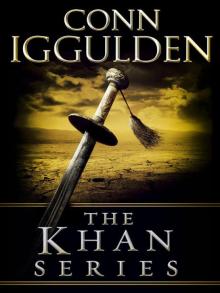 The Khan Series 5-Book Bundle
The Khan Series 5-Book Bundle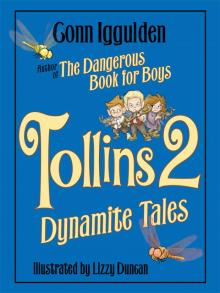 Tollins 2: Dynamite Tales
Tollins 2: Dynamite Tales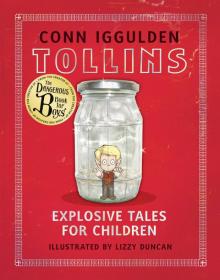 Tollins: Explosive Tales for Children
Tollins: Explosive Tales for Children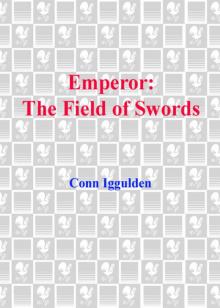 The Field of Swords
The Field of Swords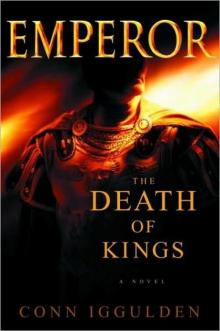 The Death of Kings
The Death of Kings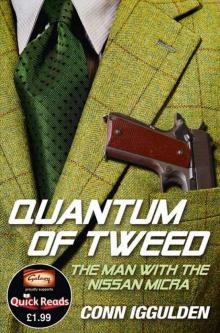 Quantum of Tweed: The Man With the Nissan Micra
Quantum of Tweed: The Man With the Nissan Micra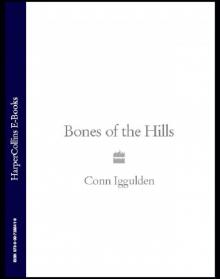 Bones of the Hills
Bones of the Hills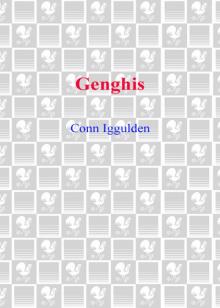 Genghis: Birth of an Empire
Genghis: Birth of an Empire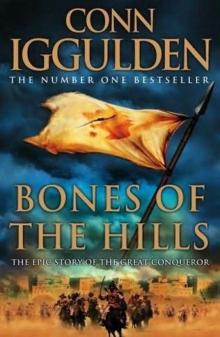 The Gates of Rome
The Gates of Rome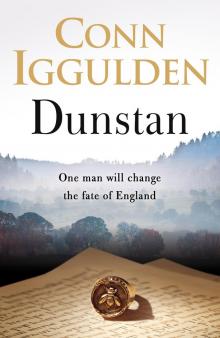 Dunstan
Dunstan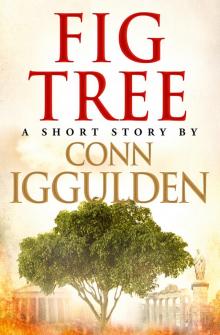 Fig Tree
Fig Tree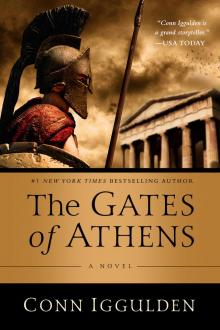 The Gates of Athens
The Gates of Athens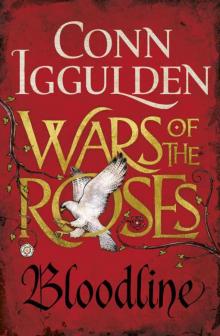 Stormbird
Stormbird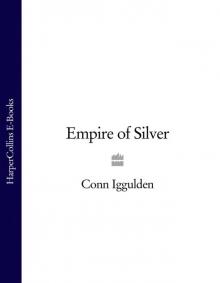 Khan: Empire of Silver
Khan: Empire of Silver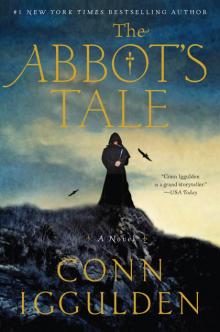 The Abbot's Tale
The Abbot's Tale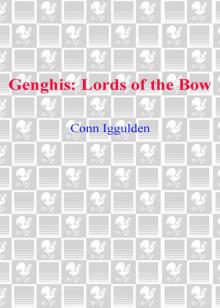 Gengis: Lords of the Bow
Gengis: Lords of the Bow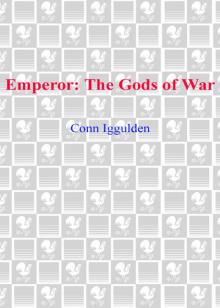 The Gods of War
The Gods of War Blackwater
Blackwater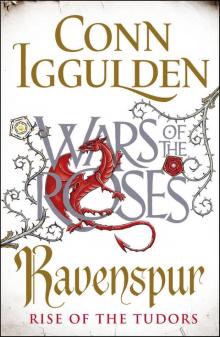 Ravenspur: Rise of the Tudors
Ravenspur: Rise of the Tudors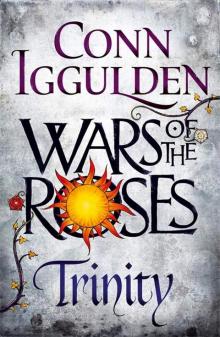 Wars of the Roses: Trinity (War of the Roses Book 2)
Wars of the Roses: Trinity (War of the Roses Book 2)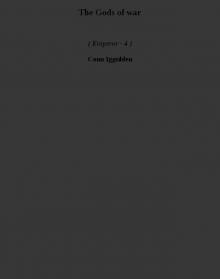 The Gods of war e-4
The Gods of war e-4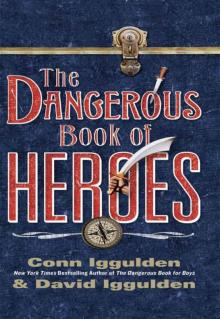 The Dangerous Book of Heroes
The Dangerous Book of Heroes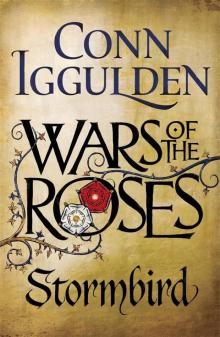 Stormbird wotr-1
Stormbird wotr-1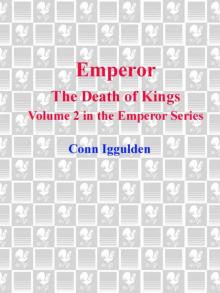 Emperor: The Death of Kings
Emperor: The Death of Kings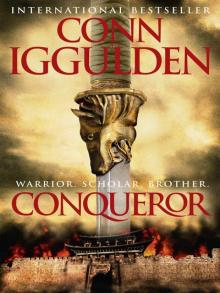 Conqueror (2011) c-5
Conqueror (2011) c-5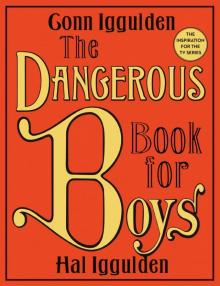 The Dangerous Book for Boys
The Dangerous Book for Boys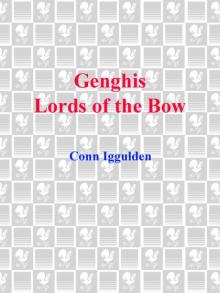 Genghis Lords of the Bow
Genghis Lords of the Bow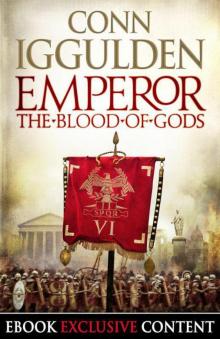 Emperor: The Blood of Gods (Special Edition) (Emperor Series, Book 5)
Emperor: The Blood of Gods (Special Edition) (Emperor Series, Book 5)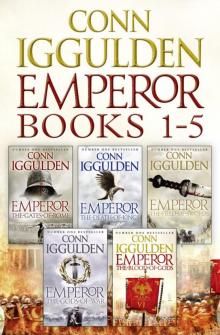 The Emperor Series: Books 1-5
The Emperor Series: Books 1-5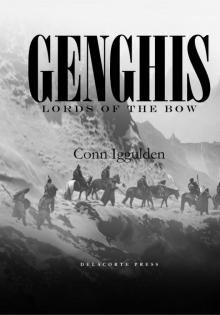 Lords of the Bow c-2
Lords of the Bow c-2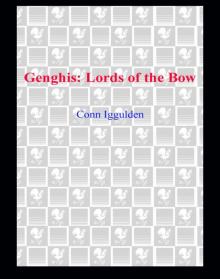 Lords of the Bow
Lords of the Bow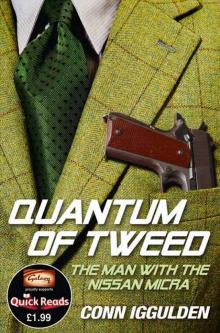 Quantum of Tweed
Quantum of Tweed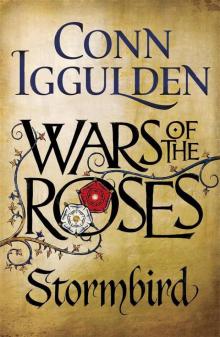 Wars of the Roses 01 - Stormbird
Wars of the Roses 01 - Stormbird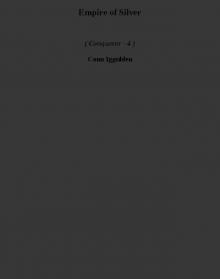 Empire of Silver c-4
Empire of Silver c-4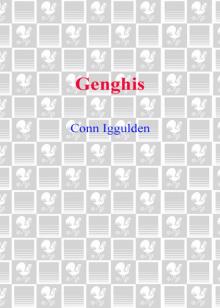 Birth of an Empire
Birth of an Empire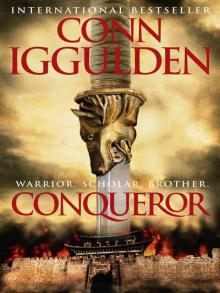 Conqueror (2011)
Conqueror (2011)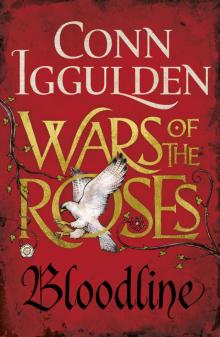 Wars of the Roses: Bloodline: Book 3 (The Wars of the Roses)
Wars of the Roses: Bloodline: Book 3 (The Wars of the Roses)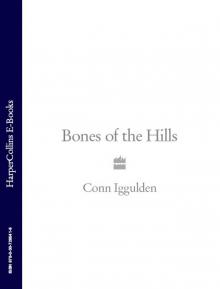 Bones Of the Hills c-3
Bones Of the Hills c-3 Empire of Silver
Empire of Silver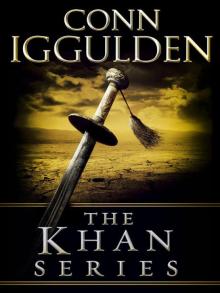 The Khan Series 5-Book Bundle: Genghis: Birth of an Empire, Genghis: Bones of the Hills, Genghis: Lords of the Bow, Khan: Empire of Silver, Conqueror
The Khan Series 5-Book Bundle: Genghis: Birth of an Empire, Genghis: Bones of the Hills, Genghis: Lords of the Bow, Khan: Empire of Silver, Conqueror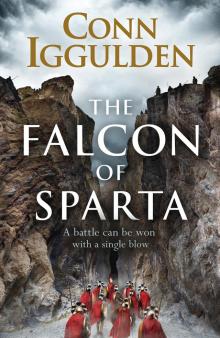 The Falcon of Sparta
The Falcon of Sparta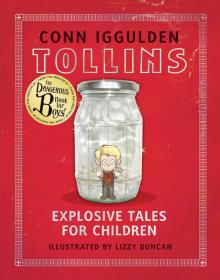 Explosive Tales for Children
Explosive Tales for Children